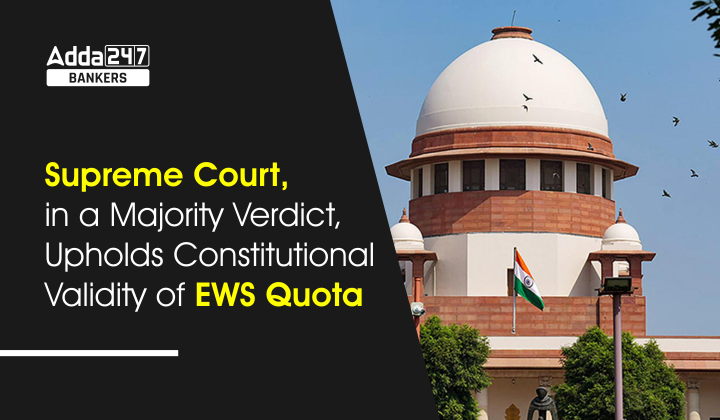Table of Contents
Supreme Court, in a majority verdict, upholds constitutional validity of EWS quota: The Supreme Court’s Constitution Bench upheld the validity of the 103rd Constitutional Amendment, which provides 10% reservation in government jobs and educational institutions to the “economically weaker sections of society” but excludes the “poorest of poor” from its scope among Scheduled Castes (SC), Scheduled Tribes (ST), Socially and Educationally Backward Classes (SEBC), and Other Backward Classes (OBC). Beneficiaries can use the quota to gain admission to government, private, unaided institutions, and government jobs.
What is the 103rd Amendment?
- The Bill was introduced in Parliament in January 2019 and was later passed by both the Lok Sabha and the Rajya Sabha before receiving presidential assent.
- It establishes a 10% reservation for Economically Weaker Sections (EWS) for admission to both public and private educational institutions (except for minority educational institutions).
- By amending Articles 15 and 16, it established economic reservation. It amended the Constitution by inserting Articles 15 (6) and 16 (6) to allow reservation for the economically disadvantaged in the unreserved category.
- It also includes similar provisions for employment in government positions.
Who is eligible for EWS quota benefits?
- Individuals with a gross annual household income of up to Rs 8 lakh.
- Excluded: Families with more than 5 acres of agricultural land, a house larger than 1,000 square feet, a plot larger than 100 yards in a notified municipal area, or a plot larger than 200 yards in a non-notified municipal area.
- Communities with existing reservations, such as SCs and STs are also excluded.
What is reservation? Does it violate our Constitution?
Reservation is a tool used by the state to ensure an all-inclusive march toward the goals of an egalitarian society while combating inequalities; it is an instrument not only for the inclusion of socially and educationally backward classes into the mainstream of society, but also for the inclusion of any class or section so disadvantaged as to fit the description of a weaker section. In this context, reservation based solely on economic grounds does not violate any essential feature of the Indian Constitution and does not harm the basic structure of the Indian Constitution.




 Daily Current Affairs 18th April 2025, I...
Daily Current Affairs 18th April 2025, I...
 Daily Current Affairs 17th April 2025, I...
Daily Current Affairs 17th April 2025, I...
 Daily Current Affairs 16th April 2025, I...
Daily Current Affairs 16th April 2025, I...





